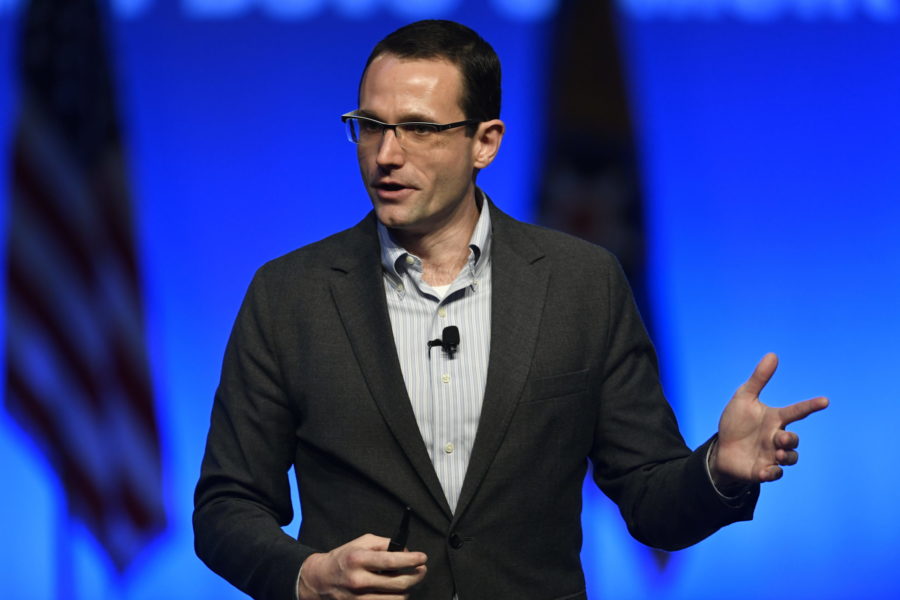Former Air Force acquisition czar Will Roper, former Chairman of the Joint Chiefs of Staff Adm. Michael Mullen, and Silicon Valley billionaire Reid Hoffman were among the seven new members of the Defense Innovation Board introduced Oct. 17, as the influential civilian advisory board held its first meeting under new chair Michael R. Bloomberg.
The DIB, composed of academics, technologists, and others experts, consults with the Secretary of Defense and offers recommendations on how the Pentagon can become more innovative and technology-friendly.
The Oct. 17 meeting, held mostly behind closed doors, marks the board’s first gathering in more than two years. Defense Secretary Lloyd J. Austin III temporarily halted the work of more than 40 civilian advisory boards and their subcommittees in January 2021, before approving the DIB and several others to resume this past February.
At the same time, Austin announced his pick of Bloomberg, media magnate and former mayor of New York City, as the new chair.
In public remarks after the first meeting, Bloomberg emphasized the need for the board to push the Defense Department to keep rapidly experimenting.
“Innovation isn’t only about science and technology. Innovation starts with people. And it requires building an organizational culture that can develop new ideas, take a few big swings, live with the inevitable misses, and then scale up the ideas that show the most promise,” Bloomberg said. “Fostering that kind of culture is where we can play a helpful role, and we are building from a very strong foundation.”
The seven new members of the board introduced include:
- William Roper Jr., distinguished professor at Georgia Tech, senior adviser at McKinsey and Company, and former assistant secretary of the Air Force for acquisition, technology, and logistics.
- Reid Hoffman, co-founder of LinkedIn, co-founder of Inflection AI, and partner at Greylock.
- Adm. Michael Mullen, former Chairman of the Joint Chiefs of Staff and Chief of Naval Operations
- Gilda Barabino, president at Franklin W. Olin College of Engineering.
- Susan Gordon, Board of Directors member at CACI International, Avantus Federal, MITRE, and BlackSky.
- Ryan Swann, chief data analytics officer at Vanguard.
- William “Mac” Thornberry, former Chairman of the House Armed Services Committee and member of Board of Directors at CAE.
Roper’s return to the Pentagon comes roughly 20 months after his tenure as the Air Force’s top acquisition official ended. Within the department, he earned a reputation as an innovator eager to push boundaries and pursue cutting-edge technology. Since he left, he had a brief tenure as CEO of drone-maker Volansi and has advised or joined the boards of several other startups.
Having experience inside and out of the Pentagon, Roper said he is hopeful “to try to bring both of those worlds together on the Defense Innovation Board.”
“I certainly know how challenging innovation is inside of the Pentagon and the services, so I plan to treat every recommendation as if I had to implement it myself,” Roper added. “And hopefully we’ll be able to help move the ball forward for those who are serving right now in government.”
In reconvening the board, Austin asked officials to look at two issues in particular, according to Bloomberg—the Pentagon’s relationship with investment capital, and input for the department’s National Defense Science and Technology Strategy.
Roper highlighted that first area as a particularly important issue and a way for the Pentagon to establish new ties with industry.
“I see huge potential for innovation in the private sector,” Roper said. “It’s a way that we can help counterbalance the consolidation that we’ve had in the defense industrial base—not the fault of those companies, it’s the way we’ve done business that’s forced that consolidation. Allowing companies that are a little bit of .com, a little bit of a .gov, be able to work successfully in national security on their path towards commercial success, global success, can be a winning formula for the U.S.”
Such an approach would also be beneficial to the Pentagon, Gordon added, as the two have become increasingly linked.
“Right now we have a much clearer picture that there is a shared value proposition between the department and private sector,” said Gordon, the former principal deputy director of National Intelligence. “We don’t totally know how to prosecute it yet. But I don’t think it’s ever been clearer that their fates are tied together, that … the national security decision-makers, the department depends on the energy in that sector.
Roper agreed, but also noted that the Pentagon should look to be strategic in its own investments and avoid duplicating efforts in the private sector.
“Not everything needs to be a huge priority, because the private sector is going to move a lot of technology along—and shame on this building if it doesn’t leverage it—but it’s not going to move everything along at the pace that the warfighters will need,” Roper said. “So I think it’ll be different today than it would have been, say, 15 years ago doing this. So there will have to be a proper dissection of what technology will be moved because of private investment for commercial means that can be leveraged, and this building needs to be a fast adopter of it, and then what technologies will not be, and this building needs to be the investor and the accelerator itself. And if it gets that right, it gets the best of both worlds.”
